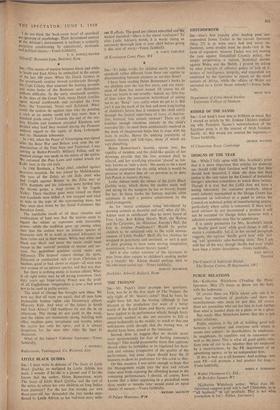Stn,—The causes of tension between black and white in South
and East Africa lie embedded in the annals 01 the last 300 years. When the Dutch farmers in the seventeenth century moved northwards through the Cape Colony they annexed the hunting grounds and water holes of the Bushmen and Hottentots without difficulty. In the early nineteenth century, in the days of the Great Trek, many Dutch families again moved northwards and occupied the Free State. the Transvaal, Natal and Zululand. What could the natives do against men who by pointing a stick at an enemy could kill him more than a hundred yards away? Towards the end of the cen- tury Rhodes and Jameson occupied Rhodesia and divided what land they wanted among the Pioneers without regard to the rights of King Lobengula and his Matabele tribesmen.
In 1902, when the Peace of Vereeniging was signed after the Boar War and Britain took over the ad- Ministration of the Free State and Transvaal, I was serving in Baden-Powell's Military Police, and no marked change was made in the status of the native. We enforced the Pass Laws and raided kraals for Kaffir beer in the old style
In 1906 Bambata, a Natal chief, rebelled against excessive taxation. He was joined by Mehlokazulu (the eyes of the Zulu), an old Zulu chief who had fought against Britain in the Zulu war of 1879. Bambata and his followers were herded into the Momd gorge, a deep ravine in the Tugela Valley. There machine guns were turned on them and hundreds were killed. A few escaped and tried to hide in the tops of the surrounding trees, but they were shot down by the Natal Volunteers like barndoor fowls.
The inevitable result of all these victories and confiscation of land was that the natives came to regard the whites as supermen with irresistible Power—while the traditiOn grew up among white men that the natives were an inferior species of humanity only fit to work as manual labourers on their farms and in their mines. White was white and black was black and never the twain could meet except in the 'natural' position of master and ser- vant. No individual qualities could make any difference. The leopard cannot change his spots. Educated or uneducated, rich or poor, Christian or heathen, good or bad, clever or stupid—all were men and women of an inferior species, and that was that.
But there is nothing stable in human affairs. What is all right today may be all wrong tomorrow. Only sixty years ago Imperialistic Power was the pride of all Englishmen—Imperialism is now a bad word not to be used in polite society.
The wind of change has brought new ideas. We now say that all races are equal, that all men have inalienable human rights and Democracy abhors Minority Rule. And what of the future in South and East Africa? Old traditions do not die in an afternoon. The strong do not yield to the weak, and the whites are immensely strong, bristling with rifles, machine guns, aeroplanes and bombs, while the native has only his spear, and it is always dangerous for the man who rides the tiger to dismount.
What of the future?, Viderunt Sapientes.—Yours faithfully,
J. BOXWELL Butlerstown, Tom haggard, Co. Wexford, Eire


































 Previous page
Previous page